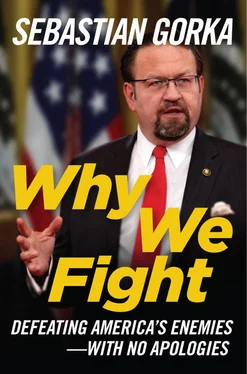The purpose of this book is to help the reader understand the nature of war and America’s experience with war since 1776, to spotlight former and current enemies, to identify what is necessary to defeat them, and to pay homage to those who have taken the fight to America’s foes.
The master strategist Carl von Clausewitz famously described war as “the continuation of politics by other means.” And yes, governments can pursue their national interests by war when all other options have failed. Yet war is much more than the calculated exercise of violence by nation-states. If years since 2001 have demonstrated anything, it is that war is not the preserve solely of countries and their governments. The violent enterprises of the Global Jihadist Movement (al-Qaeda, Boko Haram, and the Islamic State), cult-like terrorist groups such as the Lord’s Resistance Army, and the pro-Kremlin “militias” fighting the Ukrainian army in Crimea can all be described as war.
Many people associate the word “war” with images from Saving Private Ryan : massed tank units engaging one another in the open and men in uniform fighting on a distant battlefield. They presume that armed conflict begins with declarations of war and ends with formal ceasefires and peace treaties. As we shall see, however, that type of war is historically the exception to the rule.
Over the centuries, most conflicts have been far less regularized than the world wars of the twentieth century or even the first Gulf War of the 1990s. Today’s messy conflicts are more representative of mankind’s past wars than the conventional and regularized conflicts we have spent so much time preparing our militaries to fight.
The untidy wars of the post-9/11 era do not fit well into the conventional understanding of why and how wars are fought and ended. Today there are no clear battle lines or fronts, enemy capitals to capture, or days to formally mark the end of hostilities and the return of our troops. Partially as a result of these changes and ambiguities, many question the rationale for our military engagements abroad and the new “national security” measures taken domestically in the name of our increased safety.
But it is indisputable that the world is a dangerous place and America will always have enemies. We need to understand them, deter them, and if that fails, vanquish them in battle.
WHAT IS WAR?
The History of the Peloponnesian War by the Athenian General Thucydides (c. 460–c. 395 B.C.) is still studied at military academies and war colleges around the world. In this remarkable chronicle of the war between Athens and Sparta, the great historian offers an explanation of why societies go to war. For Thucydides, there are three reasons to send men to kill other men. The first is fear —fear of what will happen if one does not fight. The second is honor —a concern to maintain or restore a society’s prestige. The third is self - interest —the profit of the community. Any one or more of these motivations may be present in a given conflict. Thucydides’ list seems reasonable to the layman, for these motivations appear to explain wars as diverse at World War II, the Vietnam War, and the post-9/11 Global War on Terror.
Adolf Hitler’s invasion of Poland in 1939 can be explained as the pursuit of honor and self-interest, his desire to establish a “thousand-year Reich,” and the need for more territory— Lebensraum —for his racially “pure” and inherently evil Aryan Empire.
In fighting the Vietnam War, America invoked the doctrine of “containment,” which expressed our fear of the spread of communism (the “domino theory”), the global dominance of the Soviet Union, and possibly even a third world war.
US operations in Afghanistan after 9/11 were, at least initially, justified by the national interest, and even fear of, another mass-casualty attack on the territory of America, masterminded and organized in the al-Qaeda bases and training camps that the Taliban had allowed Osama bin Laden to build in their country.
If we move from antiquity to the modern age, we encounter another great general-author, the Prussian General Carl von Clausewitz (1780–1831). His posthumously published masterpiece On War is famous for the dictum cited above that war is simply “the continuation of politics by other means.” This phrase, which has become a principle of modern war, is cited to explain violent conflict as just another function of the state: the option left to a government when other methods for achieving its objective have failed.
Clausewitz is also rightly famous for his observation that conflict is complicated by friction : the unforeseen challenges that make a war plan last only as long as first contact with the enemy, and by the fog of war : the lack of clarity and certitude on the battlefield which can be penetrated only by the skill of the military commander.
Perhaps the greatest sustained influence of Clausewitz’s On War is an indirect one. The idea of war as “politics by other means” rests on the assumption that war is something governments decide to do, an assumption reinforced by what he called his “wondrous trinity.” Adapting a construct that would be familiar to his Christian readers in Europe, Clausewitz described the nations that go to war as having three internal populations:
He assigns to each member of the trinity a fundamental characteristic:

According to Clausewitz, a country’s three key communities come together on the basis of their distinct traits in wartime.
The government, the political elite, makes the decision to go to war based on a reasoned calculation of the needs of the state ( raison d ’ état ). Politicians analyze the dangers and potential costs of going to war—or not going to war—and then make a rational decision.
The population is then mobilized to fight or support those fighting the enemy by fanning its hatred of the enemy.
Lastly, the professional military man, the commander, adroitly leverages and directs the hatred of the people to realize the reasoned interests of the state. He alone understands violent conflict and the role of chance, and he alone has the requisite expertise to manage the friction of the battlefield, to pierce the fog of war , and to lead his forces to victory.
Clausewitz’s personal experiences shed light on his analysis of the mechanics of war. As a young man, he witnessed a new way of war. As a member of the most professional military organization of his day—the Prussian Army—he saw his beloved fighting force and its proud martial culture vanquished on the battlefield by the French forces under military genius Napoleon Bonaparte.
Bonaparte hadn’t built an experienced and heavily institutionalized army to mirror the Prussian military establishment, but instead had introduced the practice of levée en masse , or mass conscription. Clausewitz witnessed Napoleon take ordinary civilians, total military amateurs, and rapidly turn them into a cohesive fighting force that beat the Prussian Army on the battlefield. The depth of this shock, in which the cream of European military culture had been violently displaced by a new way of war waged by conscripts, caused Clausewitz to focus on marshalling a people’s unbridled passion to realize the rational political interests of the state. Hence, his conclusion is that war is the continuation of politics by others means. In other words, war is logical, organized violence.
But do politicians really wage war rationally? Has war always been the result of a cold and unemotional decision by political elite? There are those who differ with the Prussian general’s understanding of war and do so quite strenuously and convincingly.
Читать дальше













